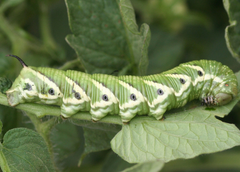Controlling Pests in Your Garden
Posted May 10, 2023

Summer comes, and so do the pests! There are several ways we can combat pests naturally and organically. Using safe methods is not only safe for you, but for your pets, beneficial insects and the soil.
One way to get a handle on pests in the vegetable garden is by planting companion plants in and around the garden. Some may attract beneficial insects that feed on the bad guys and others put off an aroma that deters and keeps pesky bugs at bay.
Nasturtiums are excellent to plant amongst squash, melons, cucumbers and pumpkins to help lessen the despised destructive squash bug. You have to plant plenty! Plant at least 4-6 seeds around each plant at the same time you plant your squash plant or seed. Don't forget! Nasturtium flowers are edible, but so are the leaves!
Borage has been shown to decrease the number of tomato horn worms on tomato plants. Seeds of borage germinate quickly and grow easily. Plant 1 seed or plant between each tomato plant. Borage has a shorter life span than tomatoes, so planting in success will be needed. This can be done by planting seed on one side of the tomato and 5-6 six weeks later plant more seed on the other side. Beware! Borage does reseed itself readily, so you may want to remove the plant at flowering stage before it drops its seed. Although the flowers are amazing, edible and I don't mind them reseeding in my garden.
Calendula provides the perfect landing pad for beneficial insects to feed on the sunshine of nectar. Parasitic wasps also get a delightful feeding, and these ravenous insects love the protein intake of aphids! Yet again, calendula petals are delicious tossed in a salad.
For a more aggressive approach for slugs, snails, earwigs, cutworms and sowbugs, you can use and organic sprinkling of Sluggo Plus. It's safe for the garden. It can withstand rain and watering the garden. It will need to be sprinkled about every 2 weeks to control the new emerging egg hatching process, but when it breaks down, its safe for the soil.
Neem, horticulture oil and mite and insect spray work good on aphids and spider mites. PLEASE PLEASE PLEASE! Only spray in the evening when the bees are at rest and never spray the flowers of your vegetable plants. This will allow the spray to be effective and do its job through the night. AND never spray when you see our friendly fellow ladybugs, lacewings and other beneficial buddies. It's a good idea to switch products between spraying. Insects can become immune overtime and spray the underside of leaves if possible.....this is where pests like to hide.
Thrips can take over before you know it! A good option for this is spinosad, Garden Insect Spray. Thrips are durable, resilient and you may need to spray a couple time to knock them on their backs...sorta speak.
One of the best things you can do for pest control is monitor your garden! Be present and not let an outbreak happen. Spend time in the garden observing to make sure your garden (and you) are in balance!
Cheers!



Comments (0 Comments)
There are no comments.
Post Comment